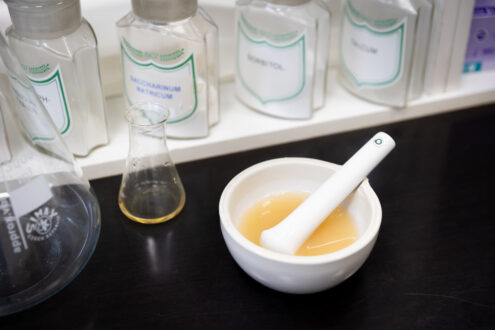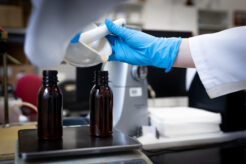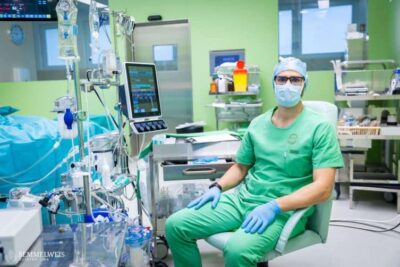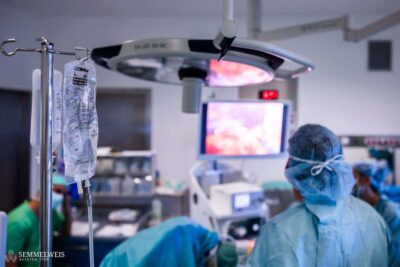In our photo report, we show the route of medicine from the wholesaler to the bedside, coordinated by the staff at the University Pharmacy Department of Pharmacy Administration.
Click on the pictures to read our photo report.
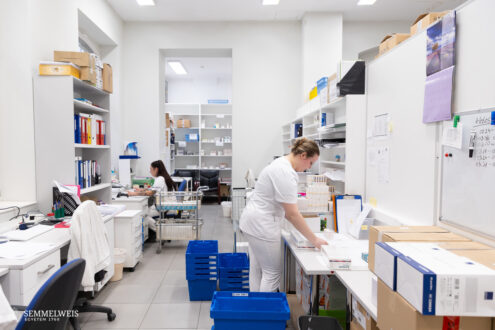
The University Pharmacy Department of Pharmacy Administration (EGYGYSZI), which cooperates closely with inpatient care and performs its tasks on nine sites, supplies all the medicines, dressings, and disinfectants needed by the patient care units of Semmelweis University. Based on the clinical needs received through the central IT system, the EGYGYSZI sites order the necessary products from several wholesalers and manufacturers, said Dr. István László Horváth, hospital and clinical pharmacist.

The institute pharmacy receives medicines in items, making sure that the contents are unopened and intact.
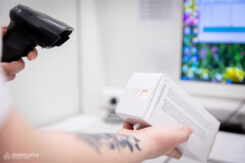
Following the itemized receipt of medicines, the drugs are entered into the medicine inventory, during which the data matrix code on each box is scanned, which not only makes it possible to trace the route of the medicine from the manufacturer to the end user, but also ensures the detection of counterfeit medicines, said Dr. István László Horváth.

The EGYGYSZI not only provides the supply of manufactured products but ensures individualized drug therapy with magistral formulas. For special patient groups, such as children, there is not always a ready-made solution to certain medication needs, therefore, the Pharmaceutical Technology Department of EGYGYSZI facilitates patient care with unique and niche products.

In addition to magistral formulas, the Pharmaceutical Technology Department also produces basic and special infusions as well as customized nutrient infusions. In addition to covering university needs, the unit also supplies other domestic inpatient care facilities, for example, with magistral formulas needed due to drug shortages.

It is common that a divided powder or suspension prepared from the factory formulation facilitates ingestion and promotes proper dosing for children. In all cases, the further processing of a finished pharmaceutical product is preceded by a risk assessment done by a pharmacist, who assesses the hazards of the manufacturing process following professional standards and determines the appropriate technological parameters and excipients to be used.

Clinical orders prepared on the EGYGYSZI sites are delivered to the medication rooms or wards of the clinics. Once again, the medicines are received in items in the medication rooms, they are checked to make sure that they have arrived undamaged and in the right quantities and then taken into the clinic inventory. The preparations are then dispensed for use based on demand in the specific wards.
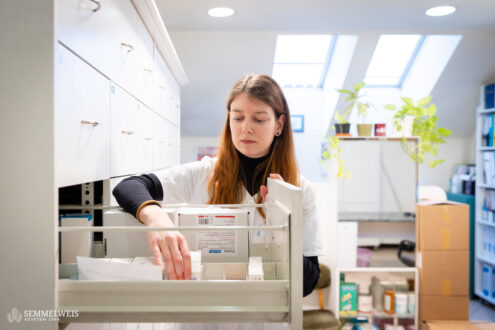
Dr. Kinga Budai, hospital and clinical specialist pharmacist of EGYGYSZI, who assists the Bókay Street department of the Pediatric Center, is checking the stock in the medicinal room. In addition to maintaining the constant supply of medicines on site, pharmacists also play a role in cooperating with attending doctors to ensure optimal and effective drug therapy.

The clinical pharmacist reviews the dosage, the pharmaceutical form, potential interactions, and possible side effects and, if necessary, may suggest changes to the attending doctor. In the meantime, the pharmacist monitors the patients’ condition, reviews temperature charts and laboratory parameters at regular intervals, and consults with doctors if necessary.
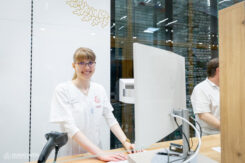
The University Pharmacy was established in 1907 as a department of the Faculty of Medicine to supply the university with medicines. This task has remained unchanged over the past 118 years: Its nine sites continue to provide a constant and safe supply of medicines to clinics. Over the last century, the scope of its activities has grown in line with the demands of the times.

Today, in addition to the basic task of supplying the pharmacies of the university institutes, the EGYGYSZI also offers pharmaceutical services for retail clients in four small pharmacies. Besides that, they provide patient-specific automated drug dispensing for nearly 800 beds, clinical pharmacy services in inpatient wards, and the production of cytostatic and complex, individualized nutritional infusions, added Dr. Szilvia Sebők, Chief Pharmacist of Semmelweis University.
Eszter Keresztes
Translation: Judit Szabados-Dőtsch
Photos by Boglárka Zellei – Semmelweis University


